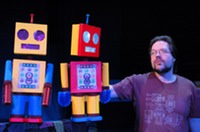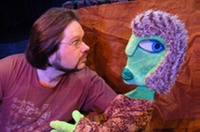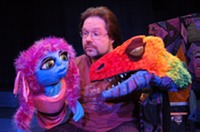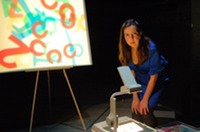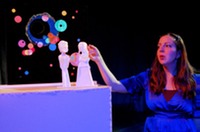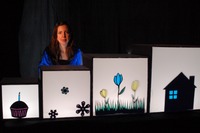Two puppet plays about the neurological conditions of
AUTISM and SYNESTHESIA
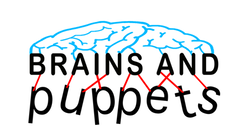
a co-production with EVOLVE COMPANY
Written by Edward Einhorn
Directed, designed and performed by
Tanya Khordoc and Barry Weil
Sound design by Henry Akona
Lighting design by Solomon Weisbard
Stage managed by Jennifer Spinello
Publicity by Emily Owens PR
At Walkerspace
March 1 - 15, 2008
Untitled Theater Company #61 and Evolve Company are collaborating to present The Boy Who Wanted to be a Robot and The Taste of Blue, two plays examining the conditions of autism and synesthesia, respectively. In both of the pieces, the protagonist is a child with a neurological condition, and the audience is invited to enter into that child’s world and experience that child’s experience. The plays are a playful examination of how the brain works, both for those of us who are “neurotypical” and for those who are not.
The Boy Who Wanted to be a Robot is a Pinocchio tale in reverse presented as a fairy tale from a foreign culture—the culture of people with Asperger’s Syndrome. Enacted by Barry Weil with a cast of puppets whose design is inspired by the work of artists with autism, the play follows the adventures of a boy who grows up surrounded by robots and then is at sea when he finds himself in a world of humans. He struggles for logic and order among people whose emotions are sometimes confusing to him.
A Taste of Blue is about a teenage girl who can taste color and see music. She has synesthesia, a condition in which the senses are mixed, a condition shared by many artists, from Kandinsky to Nabokov. Tanya Khordoc brings us into her world and shows us the incredible landscape within her mind.
Brains & Puppets comprises two short plays by Edward Einhorn, The Boy Who Wanted to Be a Robot and A Taste of Blue, which evoke the experience of young people with the neurological conditions autism and synesthesia, respectively. Both plays are designed and directed by Tanya Khordoc and Barry Weil, who each perform in one.
REVIEW:
“In The Boy Who Wanted to Be a Robot, a parable of self-acceptance, Weil plays a boy who grows up in a land of robots. His full name, Organic Unit #1, is shortened to Orgo. He struggles to understand his limitations in comparison to his efficient robot friends—“He got very tired and had many malfunctions”—and his lack of connection with other organic units. His habit of counting and listing and his mirthless bark of a laugh confuse his friend Lisa and her stepmother, but they ultimately help him find a dragon queen who holds the key to his greatest desire. Although the story is slight, the winsome puppets and gentle humor convey the importance of tolerating difference and the right of all people to define their own identity.
“Tanya Khordoc uses dyed liquids on an opaque projector and a series of light boxes to create colorful images that approximate how a person with synesthesia—a condition that causes a person to experience a blurring of sensory stimuli: “hearing” colors, “seeing” music—experiences his or her world. A Taste of Blue is a first-person narrative of a girl who is powerfully aware that she encounters her environment very differently from those around her. A honking car horn, for example, is “a burst of brownness.” While the monologue acknowledges the essential loneliness of difference, it also finds great beauty and solace in accepting one's unique perspective.
There were just a few children in the audience of Brains and Puppets at the performance I attended. It's highbrow stuff for kids, perhaps, but these lovingly created stories work magic in transforming seeming limitations into privileges.”
Christopher Murray, Backstage

